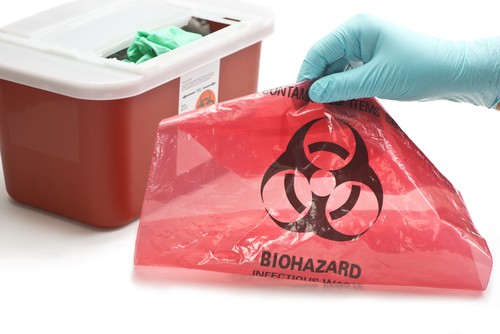Responsible Solutions: Recognizing Medical Waste Disposal Provider
In the realm of medical care, the proper disposal of clinical waste is a vital aspect that demands careful factor to consider. As medical care facilities generate numerous types of waste that require customized handling, understanding the nuances of medical waste disposal services is critical.
Value of Correct Clinical Waste Disposal
Appropriate clinical waste disposal is crucial in preserving a secure and sanitary atmosphere within healthcare facilities. In medical care setups, different kinds of waste are produced daily, consisting of contagious products, sharps, ended medications, and chemical substances.

Sorts Of Medical Waste
Within medical care facilities, a diverse selection of waste materials classified as clinical waste is produced, each requiring details handling and disposal approaches. Pathological waste, which includes tissues, body organs, and body components, requires appropriate disposal to appreciate the dignity of the departed and stop any kind of biohazards. Comprehending the different types of clinical waste is important for medical care facilities to implement efficient waste administration strategies and shield public health and wellness and the environment.
Laws and Conformity
Health care centers need to adhere to rigid policies pertaining to the handling and disposal of medical waste to make sure compliance with legal demands and safeguard public health. These guidelines are implemented to stop the spread of infections, safeguard the setting, and keep the safety of health care employees and the general public. Different governing bodies, such as the Epa (EPA), the Occupational Safety and Wellness Management (OSHA), and the Department of Transport (DOT), have specific guidelines that healthcare facilities need to follow.
To follow these guidelines, health care centers must appropriately set apart, store, transport, and take care of different types of clinical waste. This consists of sharps waste, contagious waste, hazardous waste, and pharmaceutical waste, each needing details managing treatments. Facilities should also keep exact documents of waste generation and disposal to show conformity during examinations.
Non-compliance with medical waste policies can lead to serious charges, fines, and damages to the center's credibility. Consequently, it is crucial for health care centers to stay notified regarding the most recent regulations and execute durable compliance actions to shield public health and the environment.
Benefits of Specialist Disposal Solutions
Engaging professional clinical waste disposal services uses health care facilities a reliable and trusted remedy for taking care of unsafe products. By outsourcing this essential job to experts, medical care facilities can ensure conformity with guidelines while concentrating on supplying high quality care to clients. One of the essential benefits of professional disposal services is the know-how they offer the table. These services utilize qualified experts that are well-versed in taking care of different kinds of medical waste, making certain proper partition, packaging, disposal, and transport.
Additionally, specialist disposal services utilize cutting edge devices and adhere to market best techniques to lessen environmental effect and lower the threat of contamination. This not only promotes a safer work atmosphere for health care personnel however likewise adds to overall public health and safety. Additionally, outsourcing clinical garbage disposal can cause set you back savings in the long run by eliminating the need for in-house management and disposal systems.
Sustainable Practices in Medical Care

One trick sustainable practice in health care is waste reduction. By implementing approaches to decrease unneeded product packaging, single-use products, and overall waste generation, medical care facilities can substantially lower the amount of waste sent to garbage dumps or incineration. In addition, reusing programs for materials like paper, glass, and plastic can additionally reduce the environmental effect of health care procedures.

Conclusion
Finally, appropriate company website clinical garbage disposal is critical in maintaining a healthy and safe environment for both health care employees and the public. Recognizing the different kinds of medical waste, adhering to regulations and conformity criteria, and making use of specialist disposal solutions are crucial steps in liable waste monitoring. By embracing sustainable techniques in healthcare find out this here centers, we can decrease ecological effect and ensure the health of all individuals associated with the health care market.
As healthcare centers produce numerous types of waste that require customized handling, recognizing the nuances of clinical waste disposal solutions is paramount.Within healthcare centers, a varied selection of waste materials classified as clinical waste is created, each needing details handling and disposal techniques. Recognizing the various types of clinical waste is important for medical care facilities to carry out reliable waste monitoring methods and safeguard public wellness and the environment.
By applying techniques to lower unneeded packaging, single-use products, and general waste generation, healthcare facilities can dramatically decrease the amount of waste sent to land fills or incineration. Recognizing the different types of medical waste, adhering to regulations and compliance requirements, and making use of specialist disposal services are necessary actions in responsible waste management.
Comments on “Streamlined Medical Waste Disposal Services: Concern for Public Health”